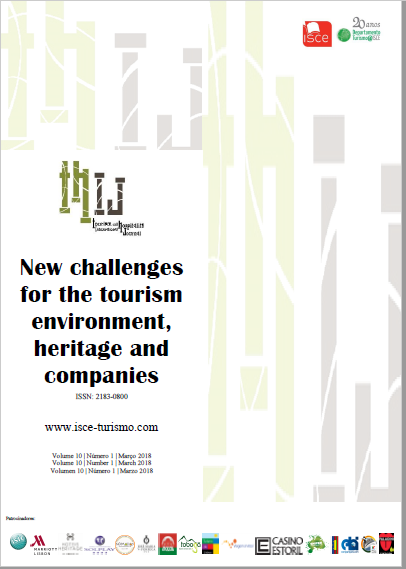Os desafios da fidelização nos restaurantes dos hotéis em Lisboa
DOI:
https://doi.org/10.57883/thij10(1)2018.30491Palabras clave:
Hotel restaurante, Consumidor, Satisfacción, Calidad, Fidelización, EstrategiasResumen
Este artículo pretende realizar un análisis de los restaurantes de hostelería desde el punto de vista del consumidor en cuanto a su estrategia de captación y fidelización de clientes. Para ello, se aplicaron 200 cuestionarios habiéndose concluido sobre la importancia de la fidelización como tema principal en los tiempos modernos, así como una eficiente prestación del servicio. También se concluyó que en este mundo global y competitivo, los programas de fidelización deben cambiar sus objetivos y los restaurantes hoteleros deben cambiar su posicionamiento y resolver algunos problemas operativos no sólo para poder atraer nuevos clientes, sino también para mantener a los demás.
Citas
Aaker, et al (2001). Marketing research. New York: John Wiley & Sons, Inc.
Akroush, M., Jraisat, L., Kurdieh, D., AL-Faouri, R., & Qatu, L. (2016). Tourism service quality and destination loyalty – the mediating role of destination image from international tourists’ perspectives. Tourism Review, 71(1), 18-44.
Allaway, A., Gooner, R., Berkowitz, D. & Davis, L. (2006). Deriving and exploring behavior segments within a retail loyalty card program. European Journal of Marketing, 40 (11), 1317- 1339.
Amin, M., Yahya, Z. Ismayatim, F., Nasharuddin, Z., & Kassim, E. (2013). Service quality dimension and customer satisfaction: an empirical study in the Malaysian hotel industry. Services Marketing Quarterly, 34(2), 115-125.
Avcikurt, C., Giritlioglu, I., & Sahin, S. (2011). An evaluation of thermal hotel web sites and the use/non-use of the internet as a marketing tool by thermal hotels in Turkey. African Journal of Business Management, 5(7), 2817-2827.
Babu, S. (2008). Tourism development and its emerging paradigms: A synthesis. In S. Babu & S. Mishra (eds.), Tourism Development Revisited. Concepts, Issues and Paradigms (pp. 177-198). New Delhi: Response Books.
Bastic, M., & Gojcic, S. (2012). Measurement scale for eco-component of hotel service quality. International Journal of Hospitality Management, 31(3), 1012-1020.
Chen, J. (2013). Factors influencing internal service quality at international tourist hotels. International Journal of Hospitality Management, 35, 152-160.
Choudhury, K. (2013). Service quality and customers’ purchase intentions: an empirical study of the Indian banking sector, International Journal of Bank Marketing, 31(7), 529-543.
Debata, B. Patnail, B., Mahapatra, S., & Sree, K. (2015). Interrelations of service quality and service loyalty dimensions in medical tourism A structural equation modeling Approach. Benchmarking: An International Journal, 22(1), 18-55.
Dedeoglu, B., & Demirer, H. (2014). Differences in service quality perceptions of stakeholders in the hotel industry. International Journal of Contemporary Hospitality Management, 27(1), 130-146.
Giritlioglu, I., Jones, E., Avcikurt. C. (2014). Measuring food and beverage service quality in spa hotels: A case study in Balıkesir, Turkey. International Journal of Contemporary Hospitality Management, 26(2), 183-204.
Jeon, M., Magnini, P., Kim, I., & Hyun, S. (2013). Causal relationships between table game players’ perceptions of service quality, perceived winning, and game spending moderating effects of demographic factors. International Journal of Contemporary Hospitality Management, 25(6), 922-944.
Khrimenko, A. (2017). Strategic vectors of transformational shifts in the national tourism system of Ukraine. CES Working Papers, 9(3), 506-528.
Kotler, P. (2000). Administração de marketing. São Paulo: Prentice Hall.
Laskarin, M., (2013). Development of loyalty programmes in the hotel industry. Tourism and Hospitality Management, 19(1), 109-123.
Munhurrun, R., Naidoo, P., & Bhiwajee, L. (2009). Employee perceptions of service quality in a call centre. Managing Service Quality, 19(5), 541-557.
Paladini, P. & Carvalho, M. (2012). Gestão da qualidade - Teoria e casos. Rio de Janeiro: Elsevier.
Pires, A. R. (2012). Sistemas de gestão da qualidade: Ambiente, segurança, responsabilidade social, indústria, serviços, administração pública e educação. Lisboa-Edições Silabo.
Saar, M. (2010). Cultural differences in spa tourism and the expectations of Finnish spa goers. Turku University. Turku, unpublished MSc thesis.
Saias, L. (2007). Marketing de serviço: Qualidade e fidelização de clientes. Lisboa: Universidade Católica Editora
Salazar, A., Costa, J. & Rita, P. (2010). A service quality evaluation scale for the hospitality sector: Dimensions, attributes and behavioural intentions. Worldwide Hospitality and Tourism Themes, 2(4), 383-397.
Seth, N., Deshmukh, S. G., & Vrat, P. (2005). Service quality models: A review. International journal of quality & reliability management, 22(9), 913-949.
Sharpley, R., & Telfer, J. (2002). Tourism and development. Concepts and issues. Clevedon: Channel View Publications.
Shaw, R. (2003). Marketing: Renovação e eficiência. Lisboa: Caminho.
Shoemaker, S., & Camille, K. (2008). Relationship and loyalty marketing. In A. P. Haemoon, O., Handbook of Hospitality Marketing Management (pp. 119-152). Oxford: Elsevier ltd.
Siebel, T. M. (2002). Princípios de e-business. Paris: Maxima
Smith, E. (2000). E-loyalty: How to keep customers coming back to your website. England: HarperCollins.
Stegemann, N. (2002). Loyalty programs in Australia: Who is in bed with whom? 18th Annual International Research Conference on Industrial marketing and Purchasing, France.
Tang, M., & Bougoure, U. (2011). Service quality: An investigation into Malaysian consumers using DINESERV. Available at: http:// smib.vuw.ac.nz:8081/ WWW/ANZMAC2006/documents/ Tang_ Keang%20Meng.pdf (accessed 2 February 2011).
Turismo de Portugal (2007). Plano Estratégico Nacional do Turismo para o desenvolvimento do turismo em Portugal. Lisboa: Turismo de Portugal.
Wijaya, S. (2005). The effect of loyalty programs on customer loyalty in the hospitality industry. Lecture hotel management program. Faculty of Economics, Petra Christian University, 24-29.
World Tourism Organization [WTO] (2017). Tourism Highligts, retrieved from http://wto/WTO_highlights_2017.pdf.
Wu, H. C. (2013). An empirical study of the effects of service quality, perceived value, corporate image, and customer satisfaction on behavioral intentions in the Taiwan quick service restaurant industry. Journal of Quality Assurance in Hospitality and Tourism, 14(4), 364-390.
Descargas
Publicado
Cómo citar
Número
Sección
Licencia
Derechos de autor 2018 This work is licensed under a Creative Commons - Attribution 4.0 International (CC BY 4.0)

Esta obra está bajo una licencia internacional Creative Commons Atribución 4.0.
Este trabalho encontra-se publicado com a Licença Internacional Creative Commons Atribuição 4.0.






